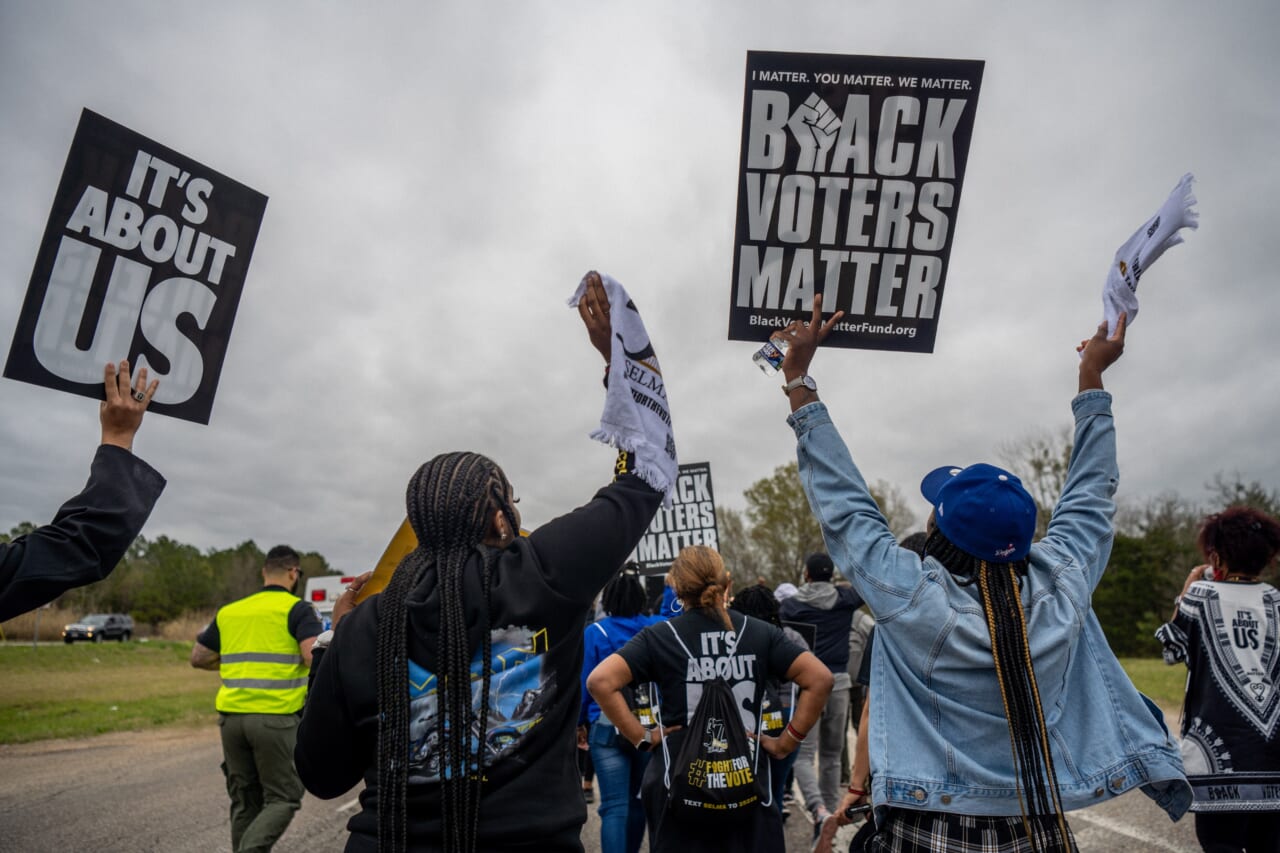We bring news that matters to your inbox, to help you stay informed and entertained.
Terms of Use and Privacy Policy Agreement
WELCOME TO THE FAMILY! Please check your email for confirmation from us.
OPINION: Three years after George Floyd’s murder, the media narrative is the so-called racial reckoning for the country has come to pass. But don’t get it twisted: Black grassroots leaders are still doing the painstaking work to build community power.
Editor’s note: The following article is an op-ed, and the views expressed are the author’s own. Read more opinions on theGrio.
Just three years after an intense focus on Black America in the wake of George Floyd’s murder, mainstream media has already shifted. The soul-searching discourse has moved back to futile left/right tit-for-tat. And too many leaders in the halls of Congress, board rooms and philanthropy, after being shocked into action by the brutality they witnessed in 2020, have slipped back to “normal.”
But all the while, Black grassroots leaders across the United States persist in their painstaking work to build community power. We can see the evidence of their success in the headlines right now: local organizations worked tirelessly to unify, build a case and garner national support from voting rights advocates to fight Alabama’s racist congressional redistricting. Black Alabamians took the case to the Supreme Court — and won.
As the presidential race for 2024 starts in earnest, democracy is on the ballot. While many eyes will be on campaign rallies and debate stages, the work of restoring democracy is being done by Black leaders like the ones who delivered the Alabama victory. This often unheralded and underfunded seismic wave of Black progress is building and will crest.
Once again, the pundits and self-appointed experts at the major networks may be the last to see it. They may not know it is coming, but we do.
Through my foundation’s support for grassroots Black-led organizing (and through a pooled fund, Democracy Frontlines Fund, that we facilitate), I get a ground-level look at the action in communities that are working to restore our multiracial democracy. Like Alabama’s against-all-odds victory, their frontline stories confound the current narratives about Black progress.
For example, reporters focused on next year’s election and already writing stories about low voter turnout will be caught off guard by Black Voters Matter’s “We Won’t Black Down” bus tour, one of 20 that crisscrossed 11 key states last year to encourage communities to head to the polls. In the face of a renewed spate of police violence and overt racist acts by campaigning officials, this work is all the more relevant. The fierce tide of beatings and arrests of protesters engaged in civil disobedience will likely include attempts to erase our votes again. The #BlackToTheBallot project of Black Futures Lab is getting ahead of these threats, educating and empowering our community to counter election disinformation and other anti-democratic tactics.
Even as the merciless abuse and death at the hands of police continue, so does an increasingly resilient movement to shift power and resources away from the current carceral system and invest them in true community safety. The Communities Transforming Policing Fund seeks to decrease police violence using alternatives to 911 that deescalate conflict, offer care when people are in crisis and focus on repairing harm. With incarceration-impacted people leading the way, groups like this are restitching the fabric of trust and relationships that help healthy communities thrive.
Further from the spotlight, the Black-led movement for well-being is putting down deep, lasting roots through the work of the National Black Food & Justice Alliance, a broad coalition focused on regaining Black land and growing nutritious food planted by our own hands. Self-determination is central to strengthening connection and community, and that is why their work to advance land grants and land stewardship is so core to future vitality. Taproot Earth centers “sacrifice communities” — marginalized places where big corporations pollute the most – in the fight against climate change through support for the Green New Deal, a proposal to invest in disaster resilience, retrain industry workers for sustainable jobs and hold big polluters accountable. With a similar focus on the long term, the Southern Power Fund invests in organizers, artists, youth and mutual aid, all of which are proven strategies for creating the joy and belonging required to drown out the hate and fear being pushed by the far right.
Confounding philanthropic silos, movement-building work resists being put in a box and labeled: The most cutting-edge groups are flowing their work strategically across issues, building new organizing paradigms and flat-out refusing to get stuck in rural vs. urban mythologies. The broad reach of State Voices, a nationwide network, encompasses 25 state coalitions that span the Black, Indigenous and People of Color (BIPOC) communities and represent a rainbow of views, inclusive of the LGBT community.
In sharing these hopeful bulletins from the frontlines, I don’t intend to paint too rosy a picture. This has been a brutal time in many ways and an era of many setbacks. The demise of Roe v. Wade, attacks against gay and trans people, the spread of hate speech fueling violent action and the fraying of our democracy all feel like riptides pushing us backward.
But underneath all this churn in our nation’s life, there is a powerful forward momentum that is as focused on building the future as it is on fighting against current oppressive realities. As the tireless Black Voters Matter co-founder LaTosha Brown reminds us, “Fierce opposition can create the greatest opportunity we’ve ever known.”
Rather than missing this next wave, media experts, thought leaders and policymaker allies should welcome its arrival — and help us create lasting progress in its wake, together.
Crystal Hayling is the executive director of the Libra Foundation and the founder of the Democracy Frontlines Fund.
TheGrio is FREE on your TV via Apple TV, Amazon Fire, Roku, and Android TV. Please download theGrio mobile apps today!

